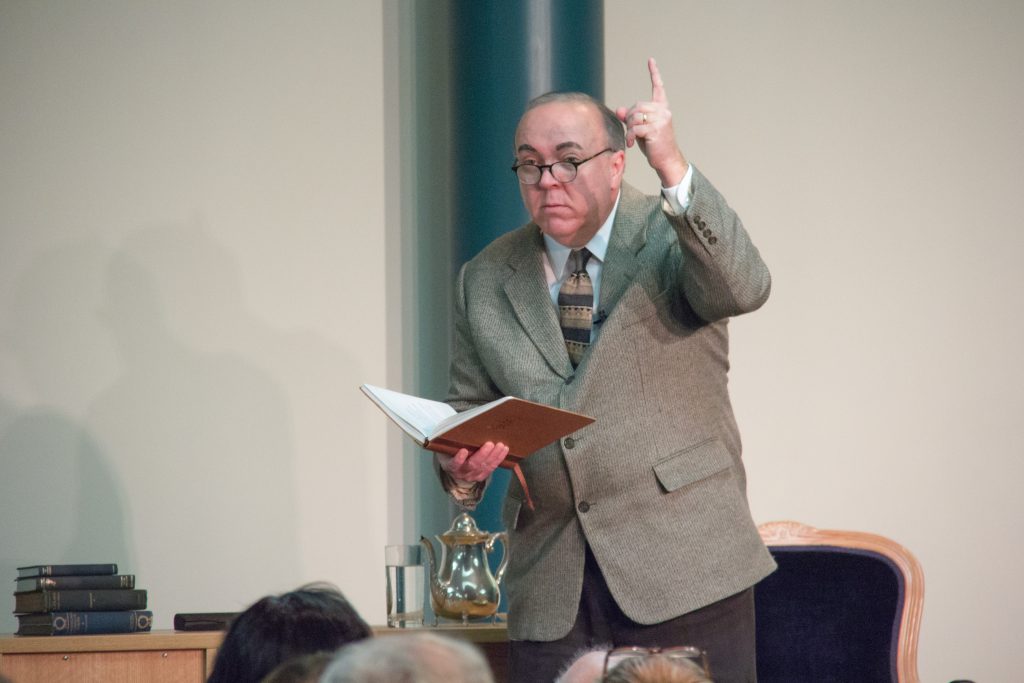
Students, faculty and staff made up a full house for Anderson University Professor of English Kevin Radaker. Through extensive research, he has compiled 13 of C.S. Lewis’ non-fiction writings into a one-man show called “A Visit from C.S. Lewis,” which he presented at the University of Indianapolis on Tuesday, Nov. 29. Lewis is best known for his series, “The Chronicles of Narnia.”
“I decided in 2007 to start rereading his works,” Radaker said, “So in the summers of ‘07, ‘08 and ‘09, I read a lot of C.S. Lewis, and [then] I had a sabbatical in the spring of ‘09. So [if] you add all that up, it’s about 50 weeks. So I was ready by the fall of 2009 to depict him. The more I can read the person’s own writings, of course, the more stuff I’ll have that I can consider putting in a monologue.”
Radaker’s performance focused on some of Lewis’ most famous non-fiction writings, such as “Mere Christianity,” “A Grief Observed” and his spiritual autobiography, “Surprised by Joy.” Through these pieces, Radaker was able to portray Lewis’ spiritual journey starting at a young age, when the faith he had established was changed because of the loss of his mother to cancer. This led Lewis to turn to atheism and search for comfort from his father, which did not help. Radaker continued to illustrate Lewis’ emotional journey to discovering hope and love at a later age, and from there, reestablishing his faith in Christianity through contemplation.
“There’s a lot of weeping,” Radaker said. “I’m barely kidding, because once you’ve read, in Lewis’ case, somewhere between 15 and 25 books, you realize there is so much here. So you narrow it down and figure out what the [content] is that you think is the most important, the most powerful, the most important thematically and stuff that will make interesting either parallels, transitions or even contrasts.”
Freshman religion major Jamarcus Walker went to the event to see Radaker impersonate C.S. Lewis.
“The lecture was designed to give insight [in]to the way C.S. Lewis himself would present information and ideas,” Walker said. “Having someone give a lecture would only give [an] impartial interpretation of C.S. Lewis’ work.”
Radaker has performed the 75-minute show more than 75 times all over the United States and in Beijing, China.
“I study, and I study, and I study the lines until I’m almost just sick of them, because I want to be very certain when I finally hit the stage,” Radaker said. “With Lewis, when I was up there tonight, I was realizing [that] I was very confident with the material, [and] I’m not worried about what the next line is, so I’m experimenting. I’m trying different tones. I’m trying different timing. I’m trying different, even, volume levels. It’s kind of fun for me because I start realizing, ‘Hey, I liked that part. I had never done it like that before.’ That’s acting, and that can be fun. It keeps it interesting, because I don’t want it to become flat. If I’m up there, and it’s just routine, then I have lost more than half the joy of doing it.”
The way Lewis talked about Christianity set him aside from others of that time.
“C.S. Lewis was one of the greatest theologians, with such a different look on religion and Christianity,” Radaker said. “His conversion to Christianity holds a high regard in relation to many others who didn’t believe in God or Jesus. ‘Lewis’ is created for the large amount of writings, sermons, and speeches that he gave.”
Radaker gave the performance through the “voice” of Lewis, based on actual recordings of Lewis’ voice that have survived through time.
“When you see me do Lewis, it’s Radaker’s version,” Radaker said. “[When] you see somebody else’s, it’s his version of Lewis. So, sure, some of my own passions, some of my own personality, some of my own ways of offering different emotions, they’re going to be to some degree taken through the filter of who I am. That can’t be helped. I love how you can try to bring a personality to life in not just a text.”







